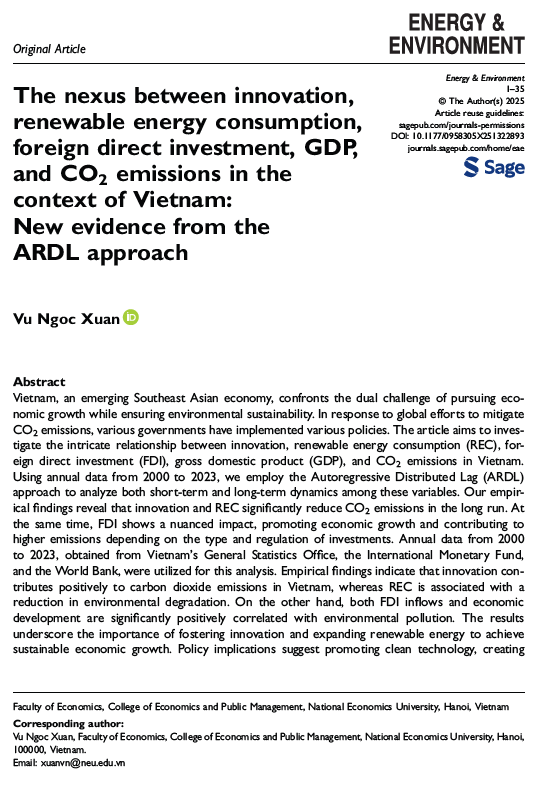
Keyword(s)
Author(s)
Vu Ngoc Xuan
Country(ies)
Publisher
Published Date
Access
DOI
Faculty of Economics, College of Economics and Public Management, National Economics University, Hanoi, 100000, Vietnam
Vietnam, an emerging Southeast Asian economy, confronts the dual challenge of pursuing economic growth while ensuring environmental sustainability. In response to global efforts to mitigate CO2 emissions, various governments have implemented various policies. The article aims to investigate the intricate relationship between innovation, renewable energy consumption (REC), foreign direct investment (FDI), gross domestic product (GDP), and CO2 emissions in Vietnam. Using annual data from 2000 to 2023, we employ the Autoregressive Distributed Lag (ARDL) approach to analyze both short-term and long-term dynamics among these variables. Our empirical findings reveal that innovation and REC significantly reduce CO2 emissions in the long run. At the same time, FDI shows a nuanced impact, promoting economic growth and contributing to higher emissions depending on the type and regulation of investments. Annual data from 2000 to 2023, obtained from Vietnam’s General Statistics Office, the International Monetary Fund, and the World Bank, were utilized for this analysis. Empirical findings indicate that innovation contributes positively to carbon dioxide emissions in Vietnam, whereas REC is associated with a reduction in environmental degradation. On the other hand, both FDI inflows and economic development are significantly positively correlated with environmental pollution. The results underscore the importance of fostering innovation and expanding renewable energy to achieve sustainable economic growth. Policy implications suggest promoting clean technology, creating favorable conditions for sustainable FDI, and diversifying the economy to mitigate environmental impacts. This article explores the intricate relationships between innovation, renewable energy usage, FDI, GDP growth, and CO2 emissions in Vietnam. By integrating empirical analysis with a review of existing literature, the article provides insights into the dynamic interactions among these variables and proposes policy recommendations for sustainable development in Vietnam. Ultimately, this research offers essential recommendations to support Vietnam in cultivating a green and sustainable economy during the Fifth Industrial Revolution era.